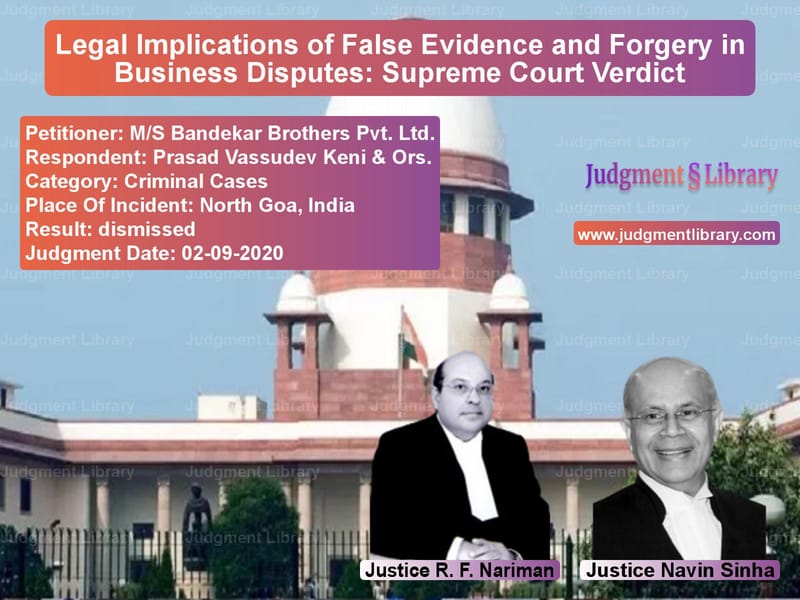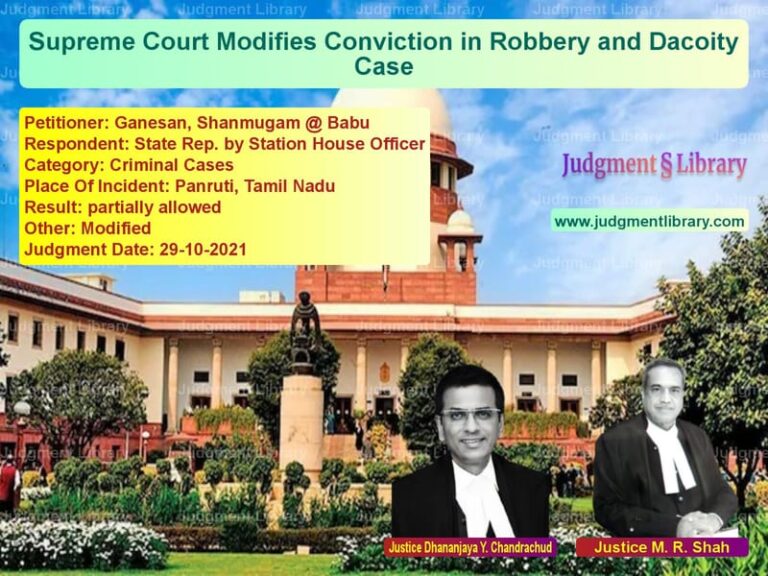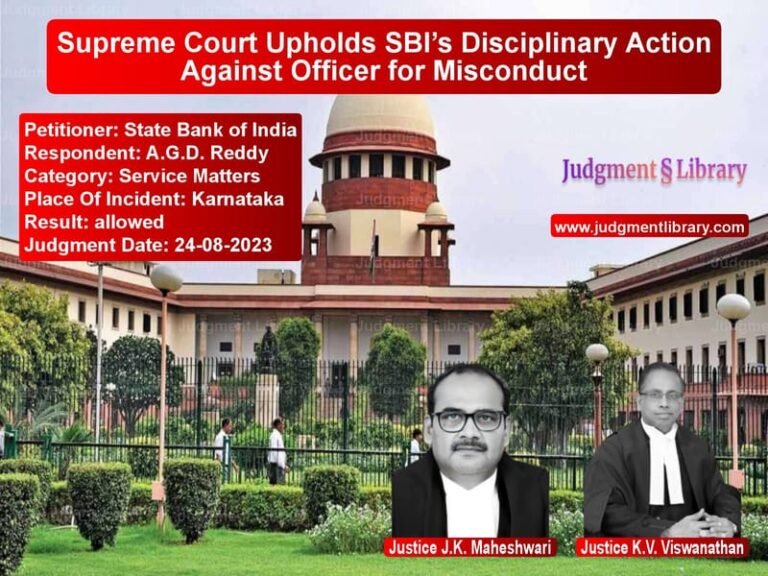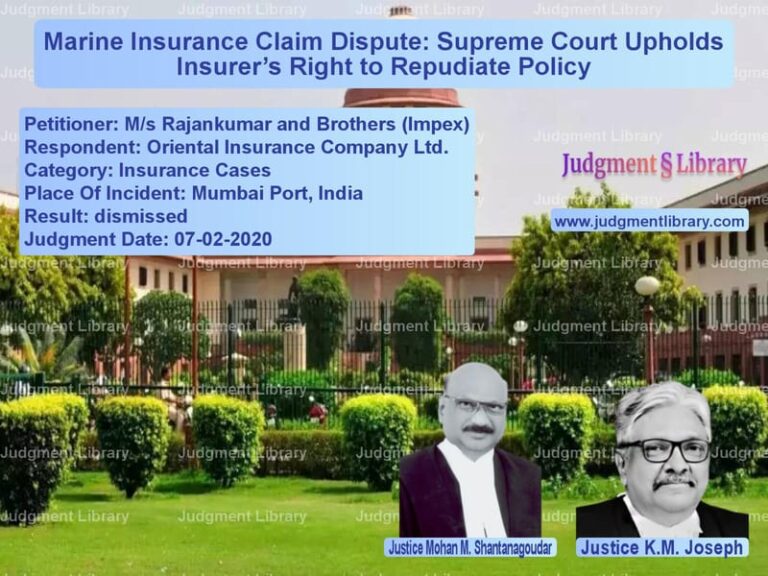Legal Implications of False Evidence and Forgery in Business Disputes: Supreme Court Verdict
The Supreme Court of India recently delivered a significant judgment in the case of M/S Bandekar Brothers Pvt. Ltd. & Anr. vs. Prasad Vassudev Keni, Etc. Etc., which revolved around allegations of false evidence and forgery in a business dispute. The case highlights critical legal principles regarding the filing of criminal complaints for perjury and the fabrication of false evidence, especially in the context of civil litigation.
This judgment clarifies the application of Sections 191, 192, and 195 of the Indian Penal Code (IPC) in judicial proceedings and reaffirms the mandatory procedural requirements under the Code of Criminal Procedure (CrPC). It also delves into the distinction between false evidence given in court and documents forged before being introduced in legal proceedings.
Background of the Case
The case arose from a long-standing business dispute between M/S Bandekar Brothers Pvt. Ltd. (the appellants) and M/S V.G. Quenim, a proprietary concern engaged in the iron ore business. Disputes between the parties led to multiple civil suits being filed in the Bicholim Civil Court, Goa.
During these proceedings, the appellants alleged that the respondents had committed perjury and had fabricated false evidence, including forged debit notes and manipulated financial records, to support their counterclaims. Based on these allegations, the appellants filed criminal complaints under Section 340 read with Section 195 of the CrPC, seeking prosecution for offenses under Sections 191, 192, and 193 of the IPC.
Initially, the Additional Sessions Judge in North Goa returned the complaints, stating that they should be filed in the same court where the alleged offenses had occurred. The complaints were then refiled before the Judicial Magistrate First Class at Bicholim.
Petitioner’s Arguments (M/S Bandekar Brothers Pvt. Ltd.)
The appellants contended that:
- The respondents had provided false evidence and fabricated documents, including debit notes, in the civil suits.
- The fraudulent documents were created to support false claims of financial transactions, misleading the court into forming an erroneous opinion.
- Since the false evidence was presented in a judicial proceeding, the complaint under Section 340 CrPC was necessary to uphold the integrity of the legal process.
- Forgery charges under Sections 463, 464, 465, and 471 IPC were also applicable as the documents were fraudulent.
Respondent’s Arguments (Prasad Vassudev Keni & Ors.)
The respondents, represented by their counsel, countered the allegations, stating that:
- The complaints were not maintainable as the alleged offenses fell under Section 195(1)(b)(i) of the CrPC, requiring a court complaint rather than a private complaint.
- The forged debit notes did not constitute a “false document” under Section 464 IPC since they were created by the respondents themselves and not falsely attributed to someone else.
- The criminal complaints were an attempt to circumvent civil litigation and harass the respondents.
- The magistrate had wrongly converted the complaints into private complaints without following the due procedure under Section 340 CrPC.
High Court Judgment
The Bombay High Court upheld the decision of the Additional Sessions Judge, ruling that:
- The complaints were correctly quashed as they failed to adhere to Section 195(1)(b)(i) CrPC.
- False evidence presented in a judicial proceeding must be prosecuted only through a court complaint, and private complaints were impermissible.
- The allegations did not amount to forgery under Sections 463 and 464 IPC, as the documents were not falsely attributed to another person.
Supreme Court Ruling
The Supreme Court upheld the High Court’s decision and reaffirmed the following principles:
- Under Section 195(1)(b)(i) CrPC, prosecution for offenses under Sections 191, 192, and 193 IPC requires a court complaint, not a private complaint.
- The complaints were correctly dismissed as they were filed as private complaints without following the procedure under Section 340 CrPC.
- The allegations of forgery were unfounded since the documents were not created with an intent to deceive another party regarding their authorship.
- Judicial proceedings must not be used as a tool for harassment, and criminal prosecution should not be employed as a substitute for civil remedies.
Conclusion and Impact
This judgment is a landmark ruling in clarifying the legal requirements for prosecuting false evidence and forgery in judicial proceedings. It reinforces the following legal principles:
- False evidence in court must be prosecuted through a court complaint under Section 195 CrPC.
- Forgery allegations require clear evidence that a document was created with the intent to mislead others about its authorship.
- Courts must safeguard against frivolous criminal complaints that could be misused to gain an advantage in civil disputes.
- The integrity of judicial proceedings is paramount, and procedural safeguards must be strictly followed.
For businesses and legal professionals, this ruling provides clarity on the evidentiary standards required for criminal complaints in civil litigation. It ensures that courts remain the gatekeepers for allegations of perjury and prevents the misuse of criminal law as a litigation strategy.
Petitioner Name: M/S Bandekar Brothers Pvt. Ltd..Respondent Name: Prasad Vassudev Keni & Ors..Judgment By: Justice R. F. Nariman, Justice Navin Sinha.Place Of Incident: North Goa, India.Judgment Date: 02-09-2020.
Don’t miss out on the full details! Download the complete judgment in PDF format below and gain valuable insights instantly!
Download Judgment: MS Bandekar Brother vs Prasad Vassudev Keni Supreme Court of India Judgment Dated 02-09-2020.pdf
Direct Downlaod Judgment: Direct downlaod this Judgment
See all petitions in Fraud and Forgery
See all petitions in Legal Malpractice
See all petitions in Public Interest Litigation
See all petitions in Contract Disputes
See all petitions in Contempt Of Court cases
See all petitions in Judgment by Rohinton Fali Nariman
See all petitions in Judgment by Navin Sinha
See all petitions in dismissed
See all petitions in supreme court of India judgments September 2020
See all petitions in 2020 judgments
See all posts in Criminal Cases Category
See all allowed petitions in Criminal Cases Category
See all Dismissed petitions in Criminal Cases Category
See all partially allowed petitions in Criminal Cases Category







